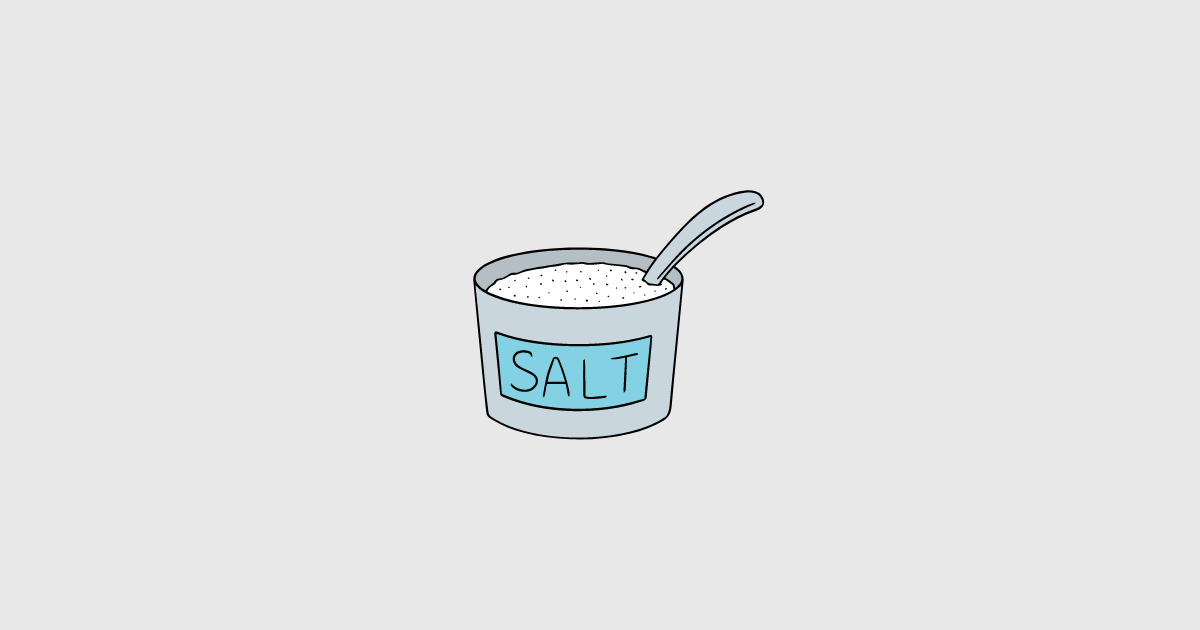- organiqs
- Posts
- Salt
Salt
Healthy or unhealthy?

Happy Monday!
This week we have a very special menu for you because we are celebrating our 20th Menu Of The Week 🍴 🎉
For this special occasion, I decided to treat myself with the domain: organiqs.co!!! (Is it getting serious? Nope, it’s still just for fun 😉)
On today’s menu we’ve got: Salt
I hope you are hungry, but before you get served…
First time reading? Sign up here
Starter 🥗
An Ancient Asset
Salt has shaped the world we live in, from serving as a status symbol to paying soldiers a salary 💰️ and creating concepts like salads 🥗 , salsas, and salvation. Its influence as an ancient commodity has built empires, started wars, and sparked revolutions.
Salt is far more than just a tasty mineral 💎 ; our bodies require it to function properly. Nowadays, we typically use it daily to cook, season, or preserve our food. However, consuming small or excessive amounts can put your life at risk! That being said, how does salt impact our overall health?
Main 🥙
The Power of Salt
Salt, also known as sodium chloride (NaCl), is composed of 40% sodium and 60% chloride. Derived from mines, evaporated seawater, or other mineral-rich waters, it can be found in various textures, tastes, and colors (and names: Sea salt, Table salt, Himalayan salt, Black salt, Kosher salt, etc.). ⛏️
Why do we need it? Many essential body processes, such as fluid balance, nerve health, nutrient absorption, and muscle function, depend on sodium.
Sodium is one of the body's most essential electrolytes, but unfortunately, it's hidden everywhere. A staggering 77% of the sodium in the average diet comes from processed foods, and that’s before adding salt to your food. 🧂
Last year, the US alone consumed around 55 million metric tons of salt. That’s the weight of about 5500 Eifel towers… of just pure salt.
Consuming too much salt can…
On the other hand, consuming too little amounts of salt may…
How much salt should you consume? The WHO suggests a maximum of 2,000 mg of sodium a day (for an average person). That’s about a teaspoon of salt. 🥄
Lastly, it’s about finding the right balance. The right balance will allow your body to perform at its optimum. (Balance is key) 🗝️
Dessert 🍰
How to Manage Salt
Many people consume too much salt on a daily basis. Here are some tips and tricks to help you manage your salt intake:
🥬 Consume potassium-rich foods if you consume a lot of salt (proven to lower blood pressure).
🥕 Choose fresh vegetables and fruits over processed foods.
🌿 Use more herbs and spices instead of salt (black pepper, garlic powder, chili flakes, or lemon juice).
🛑 Limit the use of processed condiments (sauces, spreads, or vinagrettes).
🚰 Consume sufficient water.
🏷️ Check the food labels (even sweet products can be high in sodium).
🔋 Replenisch your salt intake when being active or sweating a lot.
🧠 Try to become more conscious about salt.
Chef’s tip 👩🍳: A dish's saltiness can be counteracted by adding an acidic component, such as vinegar, lemon juice, or even tomato products. 🍋
Snacks 🥜
Dad Joke of the Week
What happened to Iron Man when he wanted some salt?
He received divorce papers from his wife, Pepper!
A Deep Question
Who are the most influential people in your life, and why?
A Friendly Reminder
Climb the mountain at your own pace.
Takeaway 🎁
You aren’t satisfied yet?
Here are my Ingredients and Best links for you:
🎙️ Podcasts: Using Salt to Optimize Mental and Physical Performance & Shaking the Salt Habit
📚️ Books: Salt: A World History & The Salt Fix
📺️ Videos: Salt: A Brief Big History & How 60000 Metric Tons of Salt are Harvested from One of the World’s Saltiest Lakes - Handmade
📑 Articles: Salt: Is it Healthy or Unhealthy? & Everything you need to know about Sodium
Thank you for being here 💝
Looking forward to serving you next week.
Much love,
Benji
How did you like this week's menu? |
Reply